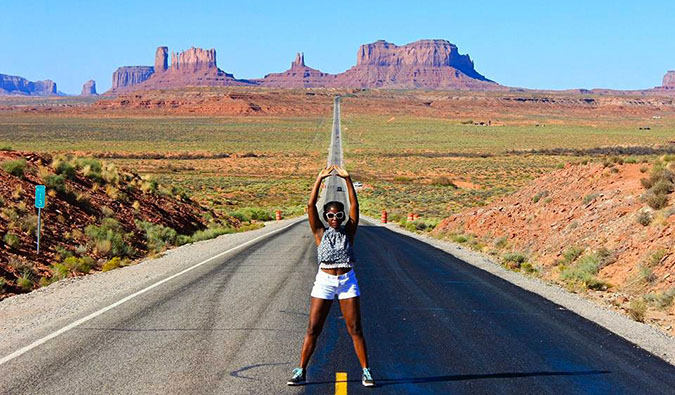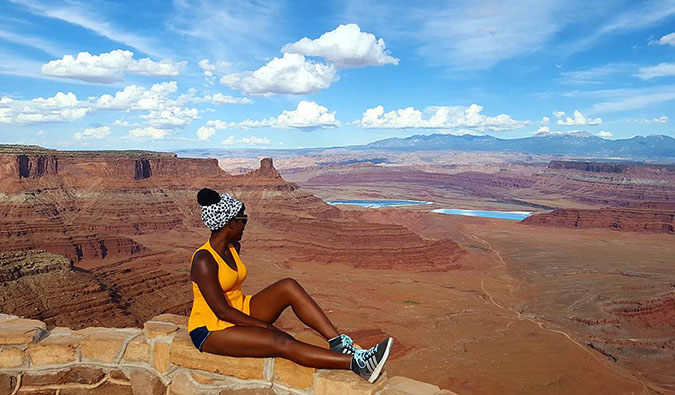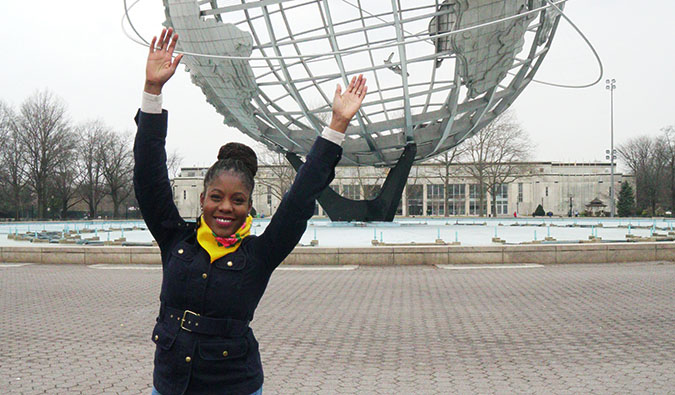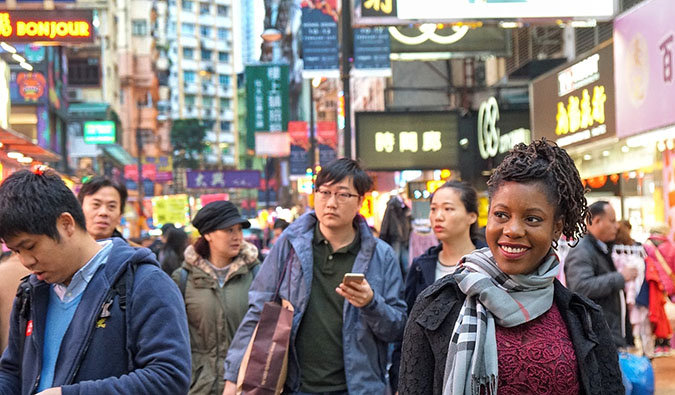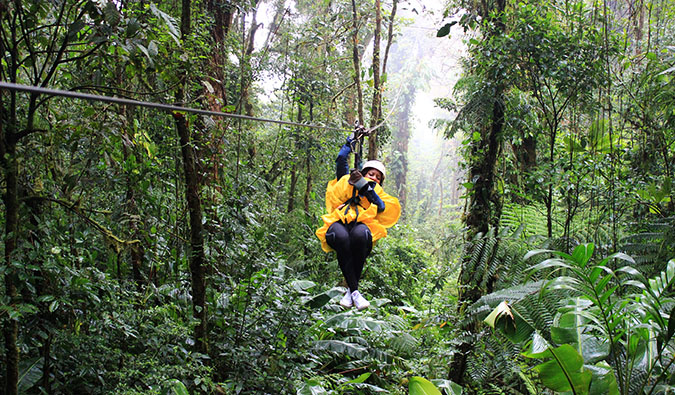How Oneika Gets Teaching Jobs Around the World
I’ve featured a lot of readers on this website: solo travelers, couples, young and old travelers, Brits, Canadians, and Americans. But there are still a lot of viewpoints I haven’t covered. So today’s reader interview brings some more diversity and perspective to our series. Today we talk to Oneika, a thirty-something black traveler from Canada who teaches in Hong Kong. A lot of e-mails ask me about racial prejudice on the road, and since it’s a perspective I can’t answer, let’s talk to Onieka about that and teaching!
Nomadic Matt: Tell everyone about yourself.
Oneika: I am a serial expat, blogger, and travel junkie who has traveled to 68 countries around the world! I hail from Toronto, Canada, though my parents were born in sunny Jamaica.
This means that even though I’m used to cold weather, I hate it — the tropics run through my veins! I’m 31 years old and have been living abroad for over eight years now. While I’m a traveler at heart, I’m a teacher by trade and currently teach middle-school English at a private school in Hong Kong.
What inspired your move to Hong Kong and love of travel?
My move to Hong Kong was inspired by a burning desire to work and travel in the Far East — Asian culture has always seemed so exotic to me, and the idea of living on the other side of the world appealed to me.
However, my first experience with intercontinental travel began during my third year of university, where I did a year-long study abroad program in France. After I realized that I could make money teaching, I spent a second year in France doing that and then moved on to do the same thing in Mexico.
Wanting more of a culture shock and remembering my initial desire to head to the Far East, I decided to look for teaching jobs in Asia.
What did you do to save up for all your travel?
As a university student, I worked odd jobs at a call center and a bank to fund my travels during school breaks. They were mostly low-paying jobs, but through diligence and penny pinching I was able to save $4,000–$7,000 USD from working part-time throughout the school year and nearly full-time from May to August.
My only regret is that I worked entirely in and around my hometown of Toronto and then used my money to take short trips internationally — somehow I never realized that I could make money whilst living abroad until I got into teaching!
At any rate, now that I’ve finished school, have moved abroad, and have been teaching full time for seven years, I try to put aside a set amount of money every month for my travel expenses. I try to cut out unnecessary spending (difficult, because I love to shop!) and prioritize travel instead.
How do you stick to a budget when you travel?
I usually plan a trip with a set budget in mind. When I was planning my recent trip to Tokyo, I did a bit of research to get a feel for how much things like transportation, food, and accommodation would cost.
I used this information to decide how much money I would need to spend on the whole trip. I attempt to set a daily budget and try to use only cash or debit when paying for things — I avoid using my credit card at all times.
I try to walk or use the cheapest forms of public transportation once at a destination. Also, I’m at the point where I’ll pick and choose which tourist attractions provide the best value: I realize I don’t need to see everything, and am not interested in spending money on a random museum/shrine/temple just because it’s listed in my guidebook! If money is an issue, I always advise people to only pay to see the things they truly care about.
You’re an English teacher. How did you get into that job?
After getting my bachelor’s degree, I taught ESL in the South of France for a year, through a English teaching assistant program offered by the French embassy. During my time in France, I met a French girl who was teaching at a boarding school just outside of London. It was then that I learned about the existence of international schools, which are schools that cater to the expat children of families who have relocated abroad for whatever reason. The language of instruction in most of these schools is English, and many of them follow a Canadian, American, or British curriculum.
When I discovered that to teach in these types of schools I would need to get a Canadian or American teaching license, I returned home and got certified to teach elementary and secondary school English and French.
It was the best decision ever! I secured an international teaching job in Mexico and never looked back. I’ve since taught in international schools in London and Hong Kong. In between I went back to Canada and taught French in a high school, but the draw of international travel made me move back abroad after a year.
Do you find it easy to get work?
I have found it pretty easy to get work in my field; there are an abundance of recruiting agencies that are geared to help both international school and ESL teachers find work abroad.
For ESL teachers, organizations like Teach Away and online job boards like Dave’s ESL Cafe are great places to start looking for jobs.
I got my ESL teaching assistant job in France through CIEP.
For certified teachers looking to teach in top international schools, recruiters like Search Associates and ISS are an excellent resource.
Many readers ask me about racial prejudice around the world. Have you ever faced any racial prejudice on the road?
Honestly? I have been super lucky in that in all of my travels I have had very few incidents where I have been discriminated against due to the color of my skin. Don’t get me wrong: in places where black people are a rarity, people stare. This has happened to me often in Asia.
In South Korea and China, people have reached out to touch my skin and hair without asking.
In Thailand, India, and the Philippines, people have stopped me to ask if they could take my picture.
Mostly, I don’t mind the attention — I think it’s hilarious, and these sorts of interactions have always been positive since the people involved were very complimentary. I understand that their interest is often fueled by an innocent curiosity; the reality is that many locals in these countries, for whatever reason, are unaccustomed to seeing black people “in real life.” This makes a huge difference in terms of how I view these sorts of interactions.
The only time I really suffered racial discrimination was when I went to Ireland on a short trip in 2009. I was in Dublin when a group of men followed me and yelled out some inappropriate racial epithets.
Despite that, I wouldn’t dare let that incident color (pun intended) my opinion of all of Ireland — it’s a beautiful country and I hope to return at some point. I have since met a number of lovely Irish people on my travels, so am convinced that what happened to me in Dublin was an isolated incident.
You travel solo. What safety tips would you give to other solo female travelers?
My #1 tip: Be prepared and stay aware of your surroundings. Don’t leave yourself open to danger.
A well-planned itinerary, in my opinion, keeps you purposeful and out of harm’s way. It’s when you wander aimlessly without a plan that you become a target.
Another tip of mine, which is perhaps controversial: Don’t dress provocatively. Yes, I know, us ladies should be able to dress any way we want, but when I travel, especially in Islamic countries where local women are expected to cover up, I do the same. It allows me to stay as “under the radar” as much as possible — I want to avoid getting negative attention at all costs.
If that means I have to leave my short shorts at home, so be it. “Doing as the Romans do” also demonstrates a respect of the local culture you are sampling.
What advice do you have for other people who are scared about traveling the world or think it’s dangerous to travel as a female?
Don’t believe the hype! The media perpetuates the idea that international travel is dangerous, but the truth is that there’s often a greater chance of tragedy befalling you in your own proverbial backyard than abroad.
Research your destination before going and inform yourself of the potential dangers so you have zero chance of becoming a victim. Another thing to do would be to connect with fellow travelers online for their perspectives on a particular place.
Travel blogs are also a great resource for getting current information from someone “on the ground” — don’t hesitate to contact your favorite bloggers for insider info.
What advice do you have for others who want to do what you do?
Get a teaching credential! Whether you teach ESL or an elementary or secondary school subject in an international school, teaching is a marketable, exportable skill that is highly sought after abroad.
School breaks and holidays are abundant, which allows you to travel on your downtime (case in point: I get 13 paid weeks of vacation a year). Teaching also allows you to have a base, which might be a better option for those who would like to travel but don’t necessarily like the idea of backpacking or being on the move all the time. Getting a diploma to teach ESL and/or a state teaching credential is relatively time and cost effective. Do it!
What is one thing you know now that you wish you knew when you started traveling?
I wish I realized that I didn’t need to see everything, that travel is not a race. I wasted a lot of time, energy, and money trying to hit up every tourist attraction in a given city, bouncing from country to country in an effort to pack it all in. Now, I prefer to travel “slower,” picking and choosing the things that catch my fancy.
Also, I wish I had taken more advantage of opportunities like the Rotary Exchange program to study abroad while in high school.
For more travel stories and tips from Oneika, check out her blog at Oneika the Traveller.
Become the Next Success Story
One of my favorite parts about this job is hearing people’s travel stories. They inspire me, but more importantly, they also inspire you. I travel a certain way, but there are many ways to fund your trips and travel the world. I hope these stories show you that there is more than one way to travel and that it is within your grasp to reach your travel goals. Here are more examples of people who found work overseas to fund their trips:
- How Jessica and Her Boyfriend Found Jobs Around the World
- How Arielle Got a Job on Yacht
- How Emily Taught English to Fund Her RTW Adventure
- How Michael Saved $14k in Six Months Making $9 Per Hour
We all come from different places, but we all have one thing in common: We all want to travel more.
Make today the day you take one step closer to traveling — whether it is buying a guidebook, booking a hostel, creating an itinerary, or going all the way and buying a plane ticket.
Remember, tomorrow may never come, so don’t wait.
Book Your Trip: Logistical Tips and Tricks
Book Your Flight
Find a cheap flight by using Skyscanner. It’s my favorite search engine because it searches websites and airlines around the globe so you always know no stone is being left unturned.
Book Your Accommodation
You can book your hostel with Hostelworld. If you want to stay somewhere other than a hostel, use Booking.com as it consistently returns the cheapest rates for guesthouses and hotels.
Don’t Forget Travel Insurance
Travel insurance will protect you against illness, injury, theft, and cancellations. It’s comprehensive protection in case anything goes wrong. I never go on a trip without it as I’ve had to use it many times in the past. My favorite companies that offer the best service and value are:
- SafetyWing (best for everyone)
- InsureMyTrip (for those 70 and over)
- Medjet (for additional evacuation coverage)
Want to Travel for Free?
Travel credit cards allow you to earn points that can be redeemed for free flights and accommodation — all without any extra spending. Check out my guide to picking the right card and my current favorites to get started and see the latest best deals.
Need Help Finding Activities for Your Trip?
Get Your Guide is a huge online marketplace where you can find cool walking tours, fun excursions, skip-the-line tickets, private guides, and more.
Ready to Book Your Trip?
Check out my resource page for the best companies to use when you travel. I list all the ones I use when I travel. They are the best in class and you can’t go wrong using them on your trip.

